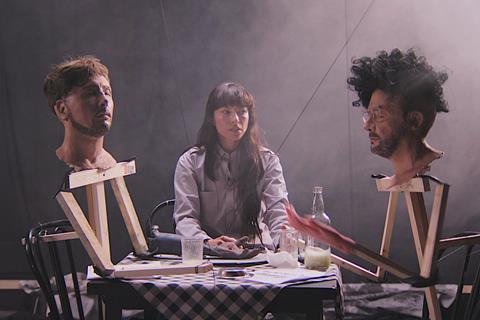Chilean provocateurs Cristobal Leon and Joaquin Cocina turn the full force of their craft to a reverie involving right-wing extremist Miguel Serrano

Dir: Cristobal Leon, Joaquin Cocina. Chile. 2024. 62mins
Less a film than an immersive experience, The Hyperboreans mixes live action, stop-motion, puppetry and much else besides in an ambitious, experimental psychodrama about the frankly deranged ideas of the controversial right-wing twentieth-century Chilean thinker Miguel Serrano. Challenging on practically all levels – and yoking together ideas from Chile’s history, the occult, right-wing conspiracy theory, Jungian psychology, silent film and elsewhere – directors Cristobal Leon and Joaquin Cocina pull it all together by virtue of their mastery of technique.
Parts are stunning, other parts are tiresome and pretentious; but none of it is boring
Perhaps inevitably, while parts of The Hyberboreans, which premieres in Directors’ Fortnight, are stunning, other parts are tiresome and pretentious; but none of it is boring, and it looks set to consolidate the directors’ reputation as producers of a distinctive, politically provocative form of animation. Their feature debut, 2018’s The Wolf House, was similarly a metaphorical exploration of a Chile still struggling to free itself from its right-wing legacy.
Events of this highly self-referential follow-up take place entirely on the elaborately constructed set of The Hyberboreans itself. In a setup that feels too long as it drops the viewer down through several dramatic levels. Chilean/German actress Antonia (Antonia Giesen, playing herself) – who is also a clinical psychologist – tells us that she was once in a film of which the negatives were stolen. (Actors here turn into puppets and back again as the sets swirl around them.)
We now relive the film through Antonia’s memories, aided by a patient of hers known only as Metalhead (Francisco Visceral). Via his dreams, Metalhead is a channel for the ideas of Serrano, whose writings combine elements of Hindu and Nordic mythologies, esotericism, and Nazi mysticism. Among other notions, Serrano – incredibly, a man of political influence in Chile – believed that Hitler did not die by suicide, but instead went to live in a paradise beneath the Antarctic ice.
For a short while the film is on relatively stable terrain, as Antonia delivers a potted bio of Serrano. But then the viewer is abruptly informed that, from now on, Antonia will become a police officer charged with recovering a stolen document. Her journey will take her to the frozen wastes of Antarctica, home of the fabled race from which the film takes its title. From there, she must occasionally return to Chile to attend to her dying parents – her father with the face of a baby, her mother an aging crone. It comes as no surprise that the figures who are really pulling the strings are Leon and Cocina themselves, who appear as characters and who are initially presented as talking heads atop flimsy wooden structures. (This motif is one of the film’s more wearying strands.)
As one part of the viewer’s attention struggles to make sense of it all, the other is spellbound by the technical wizardry on display in a film which has been made, like The Wolf House, without digital effects, and where the tech apparatus – down to the strings coming off the puppets – are always on display. The hand-painted backdrops (largely the work of Visceral, who plays Metalhead) move unsettlingly around; the camera takes off in disorienting unelected directions; the sets go from the chaos and clutter of Antonia’s parents’ room, constructed in papier mache, to the pale, empty and shadowy spaces of an imaginary Antarctica.
An authentic labour of love, it looks wonderfully home-made, like a return to the uncertain but groundbreaking origins of early sci-fi. The later sections in particular are a tender recreation of, and homage to, the artful and spellbinding techniques of Melies, while the last scene involves the audience in an unexpectedly moving way.
Giesen’s role is challenging as she goes it alone, playing a variety of roles, always on the move, sometimes interacting with other actors but more often with puppets. Elegantly choreographed as she slides around between the film’s different worlds, she sometimes becomes indistinguishable from all the artifice that surrounds her. And in a film like The Hyperboreans, that is high praise indeed.
Production companies: Leon & Cocina Films
International sales: Bendita Film Sales luis@benditafilms.com
Producer: Catalina Vergara
Screenplay: Cristobal Leon, Joaquin Cocina, Alejandra Moffat
Cinematography: Natalia Medina
Production design: Natalia Geisse, Cristobal Leon, Joaquin Cocina
Editing: Paolo Caro Silva, Cristobal Leon, Joaquín Cocina, Catalina Sandoval
Music: Valo Sonoro
Main cast: Antonia Giesen, Francisco Visceral

























No comments yet